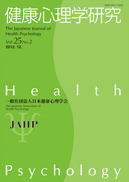Volume 8, Issue 1
Displaying 1-5 of 5 articles from this issue
- |<
- <
- 1
- >
- >|
-
1995Volume 8Issue 1 Pages 1-11
Published: 1995
Released on J-STAGE: June 13, 2015
Download PDF (1403K) -
1995Volume 8Issue 1 Pages 12-21
Published: 1995
Released on J-STAGE: June 13, 2015
Download PDF (1654K) -
1995Volume 8Issue 1 Pages 22-30
Published: 1995
Released on J-STAGE: June 13, 2015
Download PDF (1362K) -
1995Volume 8Issue 1 Pages 31-40
Published: 1995
Released on J-STAGE: June 13, 2015
Download PDF (1290K)
-
1995Volume 8Issue 1 Pages 41-55
Published: 1995
Released on J-STAGE: June 13, 2015
Download PDF (2042K)
- |<
- <
- 1
- >
- >|
